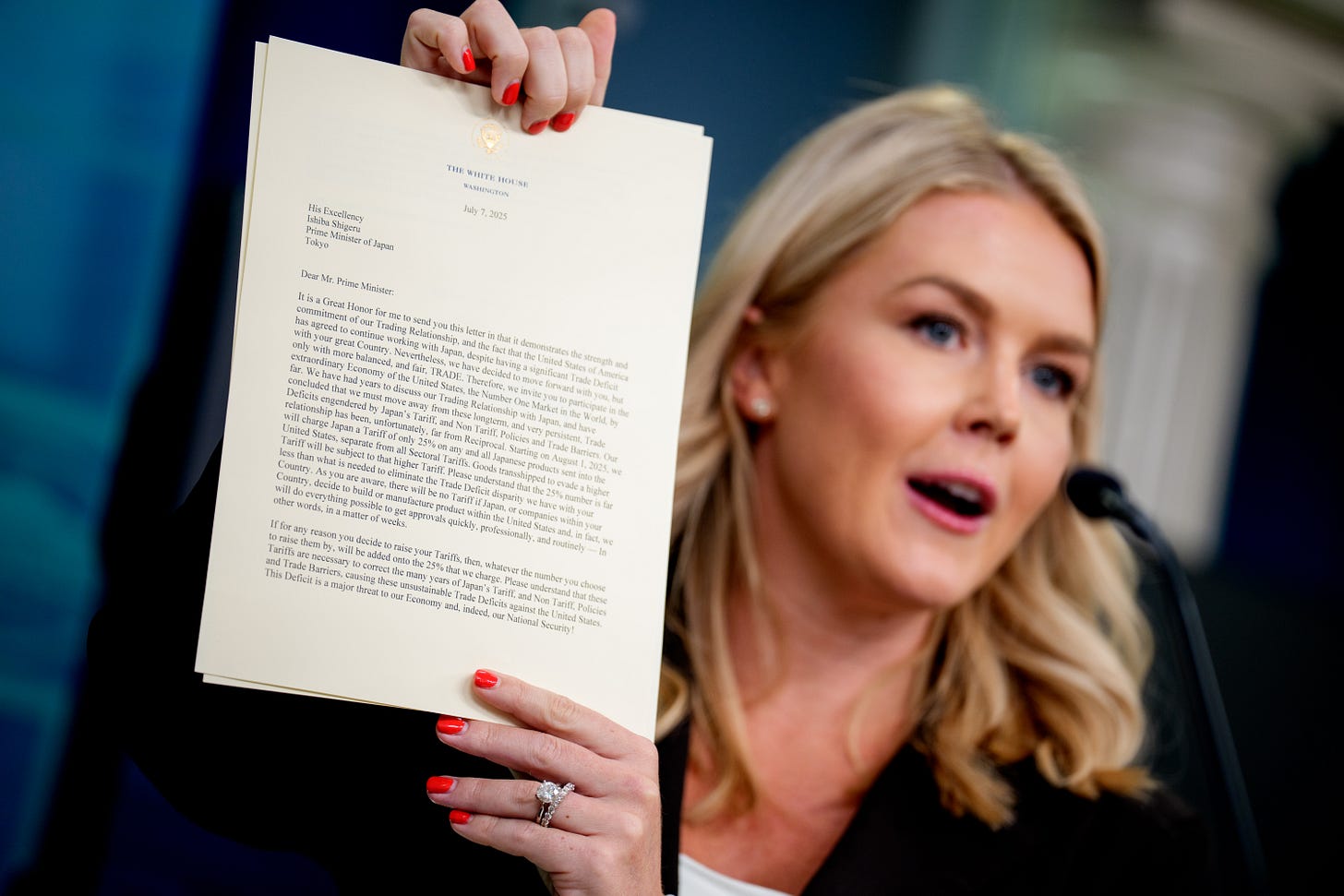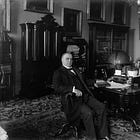An embarrassing exercise in economic and diplomatic futility
Trump's tariff letters are a joke and the joke is on us.
🗣️ Paid subscribers make Public Notice possible. If you appreciate our fiercely independent coverage of American politics, please sign up and support us. 👇
Donald Trump just escalated his mindlessly self-destructive trade war against our (former) economic allies — again.
On Monday, Trump sent rambling letters informing 14 nations, including major trading partners Japan and South Korea, that the US government was slapping them with significantly higher tariffs as of August 1. These tariffs are separate from his previously announced sectoral tariffs on automobiles, steel, and aluminum. (This week, he also announced a 50 percent tariff on copper imports for August 1.) Trump sent more letters sporadically through the week, with an especially bonkers one to Brazil threatening a 50 percent tariff if the government proceeds with its prosecution of Trump’s partner in coups, Jair Bolsonaro.
Then, as this newsletter was being finalized yesterday, Trump announced a new 35 percent tariff on Canada, citing debunked claims about the country turning a blind eye to fentanyl flowing into the United States.
Trump’s new August 1 deadline is completely arbitrary, and his tariff numbers aren’t grounded in any rational economic policy. As everyone seems to understand but the president and his sycophants, these new tariffs will result in increased prices on goods Americans need and can’t magically produce ourselves. Other nations won’t shoulder the costs from tariffs. We will.
The letters all read mostly the same, like shockingly incoherent spam e-mails with the recipient’s name in an obviously different font. They are filled with alarming typos, random Capitalization, and sloppy errors. For instance, Trump’s letter to Željka Cvijanović, the chairwoman of the presidency of Bosnia and Herzegovina, begins with “Dear Mr. President.”
The letters double down on Trump’s bizarre belief that other nations are taking advantage of the US because we run a trade deficit with them. But as even Republican Rand Paul pointed out, the average American runs a trade deficit with their local grocery store. That’s a good thing. It’s how free trade works.
What’s striking about the letters is how little Trump’s position has changed since the announcement of his supposed “Liberation Day” tariffs on April 2. He’s imposing new tariffs without actually reaching any formal trade deals with our partners. This is despite Trump’s trade adviser Peter Navarro promising “90 deals in 90 days” more than 90 days ago.
For all the bluster, the shakedown letters are yet another example of the “TACO” phenomenon: Trump Always Chickens Out. These are basically the same tariffs, just with a new “deadline.” It’s more governance through chaos.
The plan is there is no plan
Trump posted on Truth Social copies of his letters to foreign heads of government from Europe, Asia, and Africa (no word yet if he’s reaching out to the penguin island). He imposed the steepest tariff rates of 40 percent on Myanmar and Laos, but kept South Korea’s tariffs at the same 25 percent rate he originally levied on the country’s goods in April, which was temporarily lowered to 10 percent.
Trump increased Japan’s tariff rate from 24 percent to 25 percent for no discernible reason. He’s just juggling numbers, as evidenced when he told a reporter that his “formula” for calculating the tariff rates is “based on common sense.”
Like a cross between a schoolyard bully and a mob enforcer, Trump threatened any nation that dared respond in kind to his unprovoked economic assault.
"If, for any reason, you decide to raise your tariffs, then, whatever the number you choose to raise them by, will be added on to the 25 percent that we charge," Trump wrote to Japan and South Korea.
Trump claims he’s imposing a 25 percent tariff on Korea because of supposed trade deficits "engendered by Korea's Tariff and Non Tariff, Policies and Trade Barriers,” but that’s total nonsense. Under the Korea-US Free Trade Agreement, both Korea and the US eliminated tariffs on most goods. (Korea’s effective tariff rate for goods imported from the US is under one percent.)
A note from Aaron: Enjoying this article from Stephen? Then please sign up to support our work 📈 Paid subscribers keep PN free for everyone 📈
The US actually has a trade surplus of more than $410 billion with Brazil, so Trump’s tariff threat in this instance is based entirely on a personal grudge. In a blatant attempt to intervene with a sovereign nation’s domestic policies, he demanded that the so-called “witch hunt” against Bolsonaro “end IMMEDIATELY!” However, Brazilian President Luiz Inácio Lula da Silva has vowed to reciprocate if Trump follows through and implements 50 percent tariffs. That could prove damaging to the US economy, as the top exports to Brazil include aircraft and spacecraft, fuels, industrial machinery, and electrical equipment.
The whole exercise is rooted in Trump’s economic illiteracy. He’s stuck in a Gilded Age mentality about tariffs, but he doesn’t simply have outdated views. No, whenever he discusses trade, he sounds as if he’s suffering a mental episode.
For instance, during a Cabinet meeting on Tuesday, Trump rambled nonsensically that “the country had a Great Depression. And then after the Depression, long after it started, they brought back tariffs to see if they could save it. But it took them really 25 years to get out of the Great Depression. A lot of people don't understand that."
But the Smoot-Hawley Tariff Act of 1930 actually worsened economic conditions during the Depression, as anyone who watched “Ferris Bueller’s Day Off” would know. (Watch below.)
The Depression lasted about a decade and ended when the US entered World War 2. Twenty-five years after the 1929 stock market crash, America was about to enjoy an extended post-war economic boom. Trump has no idea what he’s talking about, but Joe Biden was old, so here we are.
Trump insists his trade policies are part of a patriotic push to manufacture more goods within the US when in reality he’s doing everything possible to make that less likely. It’s difficult to persuade sensible businesses to build new factories here against the backdrop of a chaotic and ever-changing tariffs, especially when the administration’s hateful deportation policies are targeting the law-abiding labor force necessary to staff them.
Bottom line, Trump’s tariffs will make life significantly worse for American families and small businesses. It’s not the “art of the deal.” It’s economic self-harm.
Deal but no deal
When asked earlier this week about that much-ballyhooed “90 deals in 90 days” promise, Trump’s response was a mental collapse that should have triggered the 25th Amendment. Trying to paraphrase Trump’s gibberish is its own form of sanewashing, so it’s important to read this in full. These are the words of the man holding the levers of our global economy:
Oh, we’ve spoken to everybody. We know every. It’s all done. I told you. I told you we’ll make some deals, but for the most part we’re gonna send a letter. We’re gonna say, ‘Welcome to the United States. If you’d like to participate in the greatest, most successful country ever.’ I mean, we’re doing better than ever. We have. I don’t think. And you’re gonna see these numbers soon. We’ve never had numbers like this. We’ve never had investment like this. Uh, we have more than 90. We’re gonna have much more than 90. But most of those are gonna be sent a letter. This is exactly what I said. Now, we’ve made a deal with United Kingdom. We’ve made a deal with China. We’ve made a deal. We’re close to making a deal with India. Others, we’ve met with, and we don’t think we’re gonna be able to make a deal. So, we just send them a letter. ‘Do you wanna, do you wanna play ball? This is what you have to pay.’ So, we’re, as far as I’m concerned, we’re done. We’re sending out letters to various countries, telling them how much tariffs they have to pay. Some will maybe adjust a little bit depending if they have a, you know, cause. We’re not gonna be unfair about it. And actually, it’s a small fraction compared to what we should be getting. We should be. We could be asking for much more. But for the sake of relationships that we’ve had with a lot of really good countries, we’re doing the way I do it. But we could be getting a lot more. We could ask for a lot more than what we’re asking for.
Obviously, sending letters isn’t a deal. That’s absurd. Trump’s just alienating foreign heads of state and making actual deals less probable. His letters decree, “These Tariffs may be modified, upward or downward, depending on our relationship with your Country.” But why would anyone negotiate with someone so unstable?
The markets are currently taking a skeptical approach to Trump’s madness, optimistically assuming the “TACO” phenomenon will prevail once again and the August 1 deadline will just get extended … and extended … until Trump eventually leaves office, still celebrating all his triumphant self-proclaimed “deals.”
The calculation is that Trump is too chicken to fully commit to his craziness, and we better hope that’s how it plays out. Because otherwise, Americans are in for some pain.
That’s it for today
We’ll be back tomorrow with a special Saturday edition for paid subscribers. If you appreciate today’s newsletter, please do your part to keep Public Notice free by signing up for a paid subscription.
Thanks for reading, and for your support.





If people read that verbatim response of Trump “explaining “ his letters, deals…..and continue to support him and declare that he is mentally fit then they should also undergo competency tests. These are not the words of a mentally fit individual, and the fact that he has both the power of his office as well as a Congress and Supreme Court majority that seem to roll over in their efforts to please him is frightening.
Once this mess is behind us and the Democrats control Congress, one of their first priorities should be to return tariff management to Congress. Having a single person determining the cost of tariffs is madness.